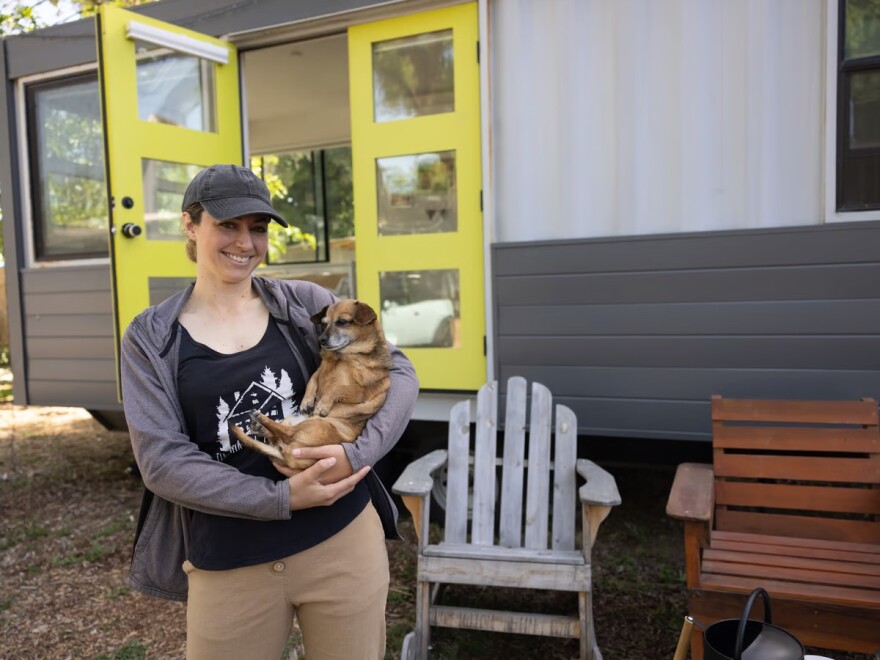Who needs extra space? Not Robyn Davis.
The West Sacramento woman tried living in a traditional 1,200 square-foot home, but: “It was too much. I was just filling it with stuff.”
Her next place was the right fit. Davis now lives in a 160-square-foot converted shipping container, what she calls her “tiny home on wheels” on a residential property she purchased two years ago.
“It’s like a studio. Like a very small studio apartment,” said Davis, 34, standing in her bedroom, which doubles as her living room and is arms-length from the kitchen. “I have the bathroom on the far right, a compost toilet, a shower, a sink. All the amenities you could need.”

But there’s still one big problem: West Sacramento doesn’t allow tiny homes on wheels in residential neighborhoods, similar to its prohibition on people living permanently in RVs.
Davis has received an abatement notice that could force her to move, but she’s also received an extension on the notice and a top city official told CapRadio there are no plans to remove her from her property.
Over the past two years, Davis has asked the city to create new rules allowing her to stay, but her case remains in limbo.
In the meantime, Davis has joined a growing group of advocates urging local governments across California to loosen zoning rules to make it easier and cheaper for people to live permanently in tiny homes.
That path is complicated by the fact that most communities prohibit tiny homes on wheels unless they’re parked in designated lots or campgrounds or connected to municipal utilities, which can cost owners tens of thousands of dollars.
Andrea Montano advocates across California for less restrictive rules for tiny homes as a member of the nonprofit Tiny Home Industry Association.
She says 18 jurisdictions including Placer County have approved tiny homes as “permissible full-time dwelling units,” either as primary residences or as accessory dwelling units. The work is personal for Montano. She lives in a traditional home in Fair Oaks with her adult children and parents and hopes to move into a 360-square foot tiny home with her husband later this year to make their income stretch further.
“A lot of people consider tiny [homes] as like a fad,” Montano said. “It’s not really about living small as it is living efficiently and within our means. And that’s kind of the change that we’re hoping for.”
The Sacramento region and communities around the state plan to use tiny homes as shelters for California’s growing unhoused population. Those structures are little more than temporary sleeping cabins. Montano and Davis say their efforts are aimed at easing rules — and costs — for tiny homes that can serve as permanent residences.
In West Sacramento, Davis says she’s hoping to convince the city to reduce a required $50,000 development impact fee, a charge that must be paid up-front before she can connect to city utilities. She said she has no way of paying a fee that high.
Currently, Davis uses solar panels, a battery and generator to power her home and receives water from a neighbor. She says the city should work with residents on creative and affordable housing options.
“I’m only one person and I’m healthy, I work remote. I don’t need that much. So why not allow people like me and others to have this option?” Davis said as she cradled her Chiweenie companion, Ruby.


West Sacramento does allow tiny homes on residential properties, but they must be attached to a foundation and connected to city water, sewer and electrical services, said Andrea Ouse, the city’s community development director.
She added that the city has urged Davis to attach her home to a foundation and pledged that it would conduct a new development analysis that might reduce the cost of her impact fee.
Davis said attaching her home to a foundation could force her to meet additional federal building code standards because it would be redefined as a modular home, increasing her costs even further. Homes on wheels must be registered with the Department of Motor Vehicles but do not need to meet the same standards as traditional dwellings.

Given California's affordable housing shortage, Ouse says the city is exploring how it might accommodate Davis and others. She says the West Sacramento City Council will ultimately decide whether to consider a possible tiny home ordinance.
“This is why we’re raising the question to the community and council — to do a check-in and determine ‘Is this appropriate?’” Ouse said.
She said there is no timeline for when the council would make that decision. As for Davis’ specific case, Ouse says the city will not ask her to move while it is researching possible changes.
“Our goal is certainly not to displace or cause for her to relocate from her property at all,” she said.
Copyright 2023 CapRadio


